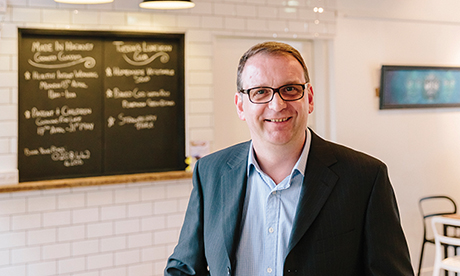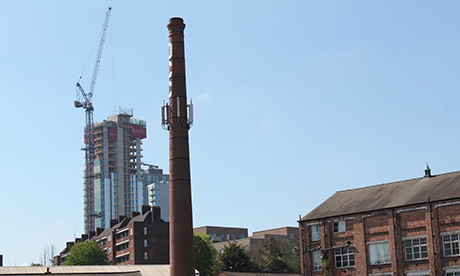Growing a community – the never-ending story of Woodberry Down

Simon Donovan, CEO of Manor House Development Trust
Just over fifty years after it was finally completed, Woodberry Down, once dubbed the “estate of the future”, is already consigned to history.
Its buildings – now a mausoleum for social housing architecture from shabby 1940s tenement blocks to sixties mid-rises of Rowley Gardens – all await demolition as the estate’s 20-year regeneration project forges ahead.
New flats mushroom on the edge of the East Reservoir at a remarkable pace, neat fountains stand primly on landscaped gravel as the glass-plated Skyline tower nudges ever higher.
But it is not just bricks and mortar that is changing – new tenants now rub shoulders with life-long estate residents in what Hackney Council hopes will become a “vibrant, mixed community of choice”.
The man tasked with cultivating this new community is Simon Donovan, the CEO of social enterprise Manor House Development Trust (MHDT) who arrived on the estate in 2007.
I find him in the purpose-built Redmond Centre hidden amongst a maze of developer hoardings. Sitting on squashy sofas neighboured by a piano, a thankfully untamed garden and a gently buzzing radio, we discuss working in the eye of the storm.
“On Woodberry Down and on many London estates there are overwhelming social challenges”, says Donovan.
“Overwhelming difficulties like unemployment, gangs, lots of fighting, lots of stabbings, lots of drugs and prostitution. Now buildings are coming down, buildings are empty, and new people have moved in. It’s overwhelming. So you have to take a strategic approach.”
No cheerleading
This strategy centres on the view that instead of “doing” community development, it is better to provide a platform on which the community can build itself.
“I’m not a Redcoat or the animation team on an all-inclusive holiday,” says Donovan. “I don’t go out there and start kicking footballs about.”
Instead of cheerleading (though the football and the zumba classes are there for those who want them) the trust employs a methodology based on five principles: connecting (“joining up those who are already organised”), empowerment (“someone who couldn’t do something, by engaging with us gets the power to do that thing”), space (“you need somewhere to do all of those things”), influence and organisation.
It’s all very third sector – buzzwords like “synergy” abound – but Donovan insists that while the language of community development is “very soft” it is necessarily so on big regeneration projects.
“What is community?” he asks rhetorically before I can ask him myself, “If you ask ten different people you’ll have ten different answers.”
Pop-up companies
But what does the trust actually do? It runs a range of initiatives, health awareness, a working at altitude course for young people on the estate, a huge volunteer scheme and has won £1m National Lottery funding to raise awareness about climate change.
One of Donovan’s tricks is to start “pop-up” companies in tandem with the private sector – such as an employment agency for apprentices who had undergone a construction course and were left at a loose end.
Many of the apprentices said if they weren’t enrolled on the construction course they would probably have gotten caught up in the Tottenham riots, explains Donovan.
He cites it as an example of how community action can get in there first, tackling social problems at their root and in the long run reducing the burden on public services.
“Think of everyone that was caught up in the riot… Eighty per cent of people who was arrested during the riots and went to prison had reoffended again. It’s a waste of money, unless you think punishment is a part of prison – and many people do.”
Flogging the assets
The trust receives grants from the three big hitters on the Woodberry Down regeneration scheme – but because “he who pays the piper calls the tune,” Donovan wants the trust to become financially independent.
This is as easy as ABCD – ‘asset-based community development’ – whereby revenue generated through the renting of buildings and spaces funds community projects.
“The money is already there” he says, “it’s about finding mechanisms to unlock it to allow it to flow out to local people.”
Asset-based development is the order of the day on Woodberry Down. But are local people always the beneficiaries?
Writing to the Hackney Citizen last winter, one resident wanted to know why his local chippie had been replaced by a shop selling frozen yoghurt.
The cheerfully-named Happy Man estate pub is also set to be demolished in the next wave of flat-building – can a community centre really replace it?
“No,” says Donovan quickly. “I don’t think you can have a community in Britain without a pub. I think what needs to happen is that developers need to think about space and think about it in such a way where it is not just about housing.”

Old and new: Redbrick Woodberry Down and the Skyline tower in the background
Social housing
Many have praised Hackney Council’s regeneration of Woodberry Down for squeezing 41 per cent social housing out of developer Berkeley Homes – but its critics say the price of the public-private partnership is too high and the terms and conditions have shifted too often.
So, is there social cleansing on Woodberry Down? Perhaps only too aware of how history has judged Woodberry Down’s first ‘estate for the future’, Donovan is more measured in his praise than the developers’ glowing brochures.
Having grown up in Bermondsey (he speaks with a strong south London patter) during Thatcher’s “land grab” of the Docklands, and worked in regeneration since the 1990s he has “experienced gentrification” on both sides.
“There’s a lot that’s going on that is worse than this” he says, “and the reason is that everyone who lives here is being rehoused. If you were decanted off the estate you have the right to return, though few will do that because your centre of gravity changes when you move.
“When I got here people were really happy just to get off of the estate. There can be a bit of looking back through rose-coloured spectacles about how it actually was. It was bloody awful, in my opinion.”
Donovan concedes that achieving community cohesion won’t be easy: “It is hard, it is really hard. But it cuts both ways. The people who have always lived here say ‘we don’t want those other people here – we’re the Woodberry Down people’.
“This is the argument I have with developers, I say your job is really easy, you have a plan you have a load of bricks you build a house and you’re finished. With community, it’s never-ending.”
